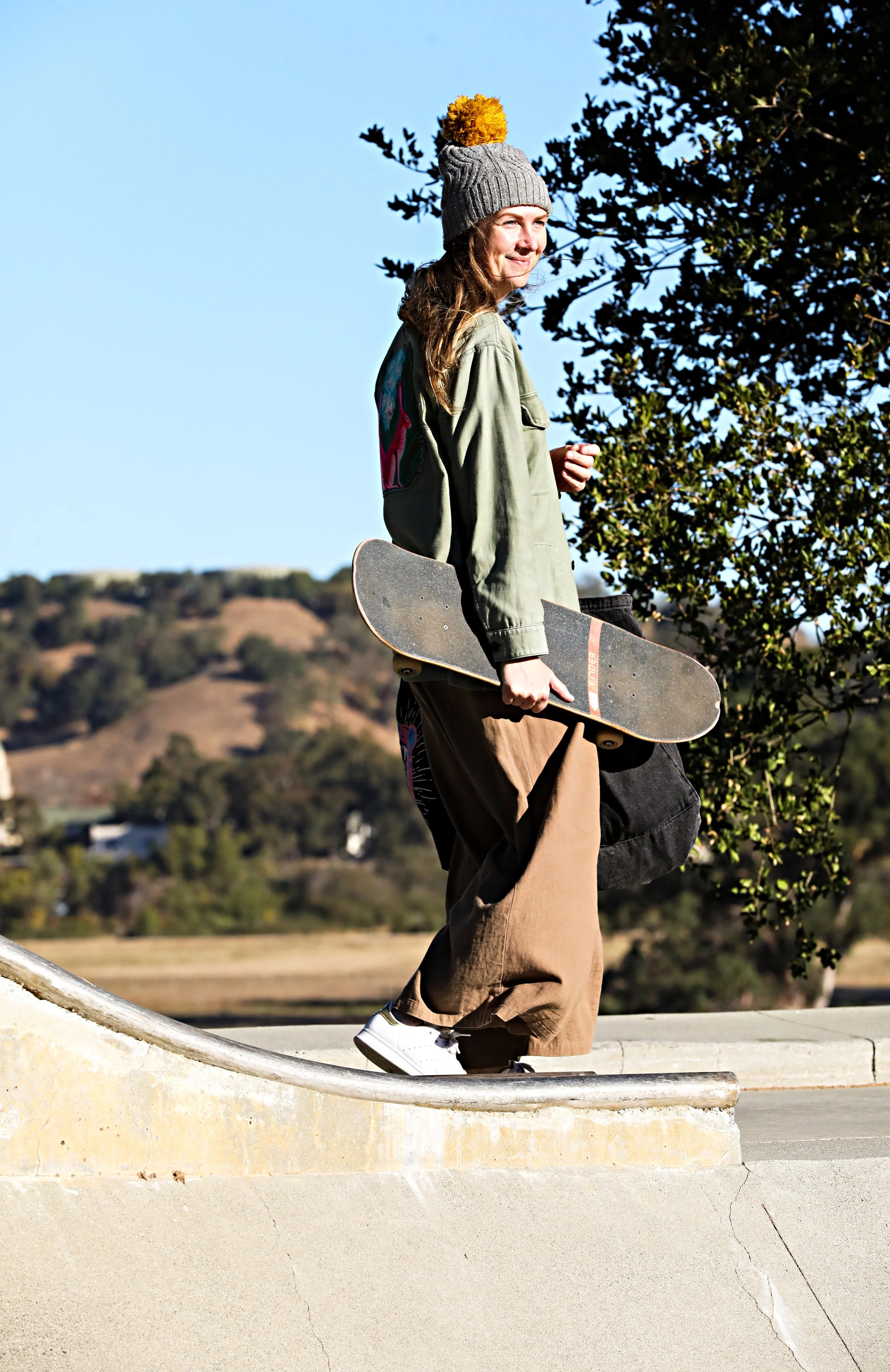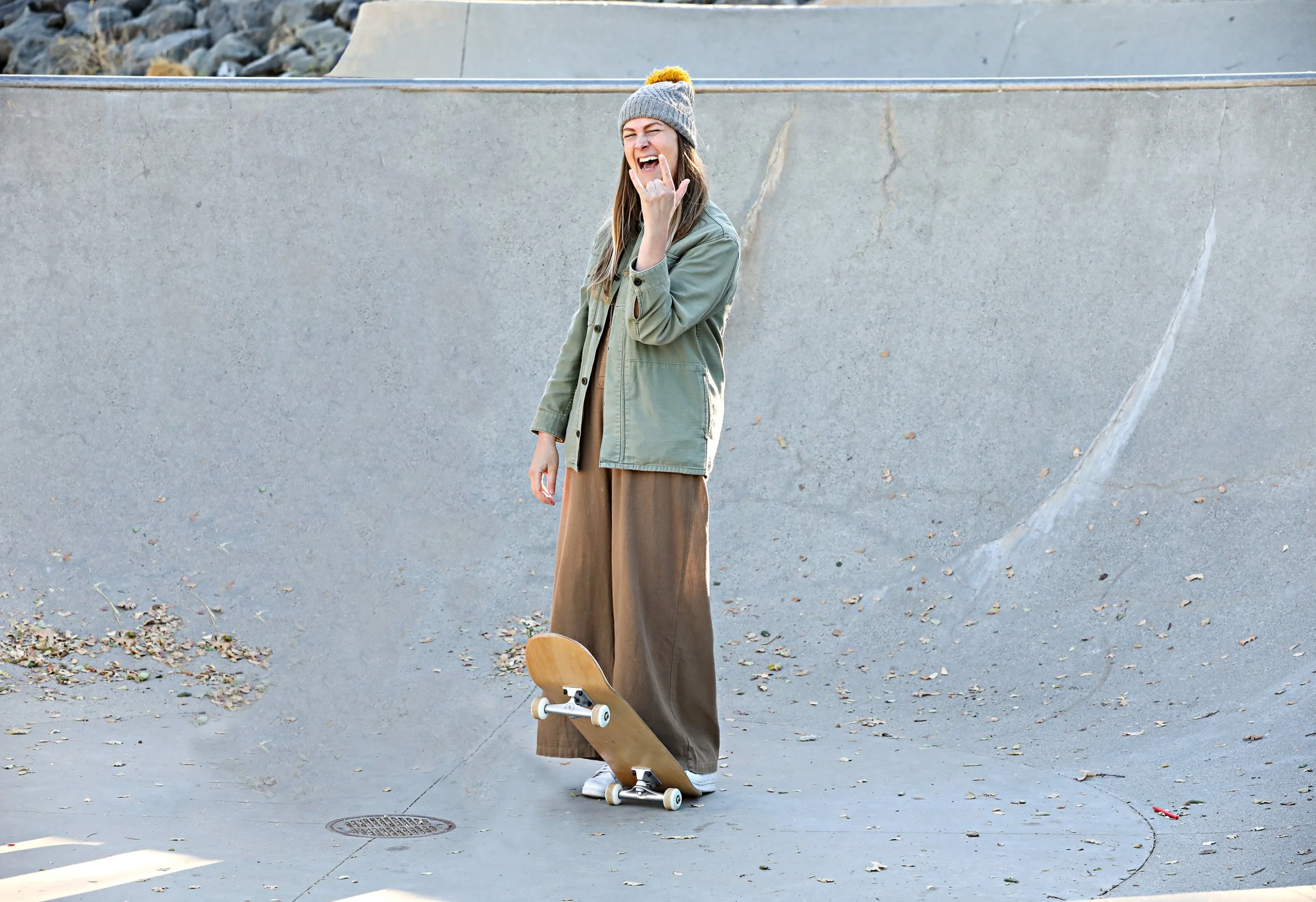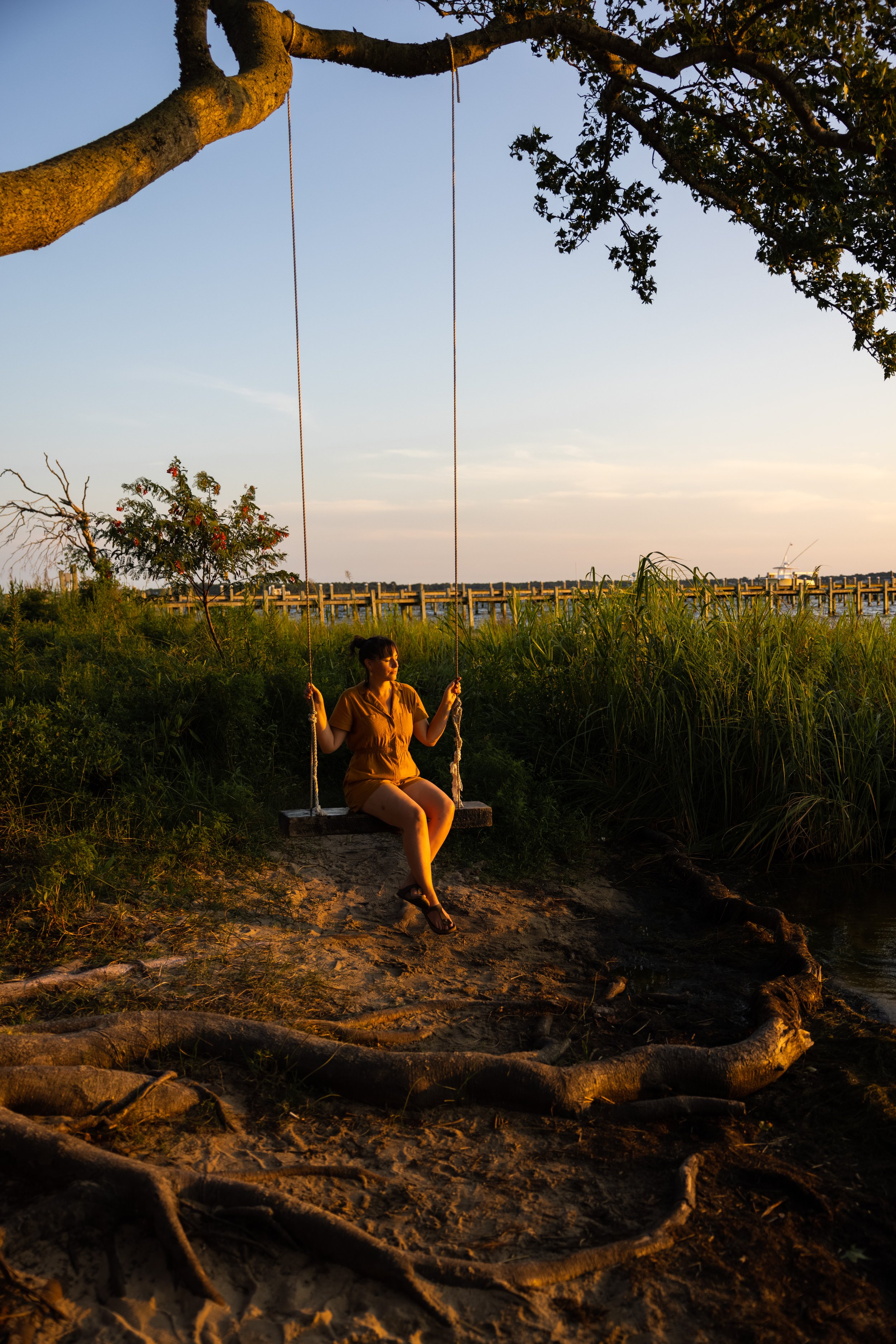Skateboarding! At her age! How saying yes to fear can lead to your greatest joy
interview by Jennifer Cooper
Photograhpy by Melissa McArdle
“I think there is a misconception that people who say yes or make big changes or take risks have a different constitution or a different body or mind. The truth is people who say yes are scared, terrified, and uncomfortable too. It’s just that they take action anyway.”
A few years ago, a friend of mine bought a balance board. It’s basically a rolling pin with a small surfboard on top that you try to stay on.
She was in her 40s and single at the time and wanted to invest in something for herself. I watched her record her progress each day on instagram and thought, Dang! That’s amazing.
We talked about one day learning to surf. At that time I was working on developing a travel show that followed a single woman having a “midlife crisis” and I wanted to film her getting a surfing lesson.
“That’d be awesome!” my friend said, adding, “Who says you can’t do it in your 40s?” “Hell yeah!” I said, knowing I’d film it but never try it given my intense fear of sharks.
While the pandemic killed my dream of producing that travel show, the dreams of women in their 40s and 50s learning how to surf lives on. Or in the case of Lisa Anderson Shaffer, learning how to skateboard.
Shaffer is a licensed therapist and like most of us, contains multitudes. She wrote a book, grew a community around curiosity, hosts a podcast, is a psychotherapist, and a coach.
And if that wasn’t enough, when she turned 45, she took up skateboarding.
What I notice most about Shaffer is that she’s guided by joy. And her curiosity feeds it. It makes sense: joy and curiosity often go hand-in-hand.
I asked Shaffer about the joy and pain in following a “non-linear” path, how she knows when it’s time to move on from something, and how in the world she got into skateboarding at our age.
I know you started out studying art. Then you became a psychotherapist. You’re also an entrepreneur, artist, and author. Your recent adventure is a podcast. That’s a lot of evolutions. How do you know when it’s time to transition from one thing to the next?
Quite often I end up in conversation with my coaching clients about not being able to cut the line of experience. Oh how I wish we could! Truth be told, it takes many years, false starts, successes, and failures to be able to look at the data of our own lives and understand that when we jump, pivot, quit, switch gears, or transition. Wherever the next adventure leads, we figure it out.
For me though, I know it is time to move on when the idea of ending something provides great relief. Sometimes there is a next step, sometimes not. So, I make an agreement with myself to be scared, but to do it anyway.
What’s the feeling you get in your body when it’s time to transition?
I used to ignore the way an experience would make me feel in my body, being afraid that if there was an ending, there would be no beginning. But time, experience, and the data of my previous decisions has shown me that I am capable of endings and beginnings.
Right now, moving on for me begins as a thought that probably has origins in a feeling—a feeling of restlessness, frustration, unease, and a particular flavor of desperation; a real lack of fulfillment and satisfaction. It feels like I am endlessly churning, like my gears are turning and there is no rest in sight; like I am hungry and nothing will fill my belly.
I know it’s time to transition when this sentence pops into my mind: I do not want to do this anymore.
This is distinct from I cannot do this anymore.
Once that thought comes to mind, I know that I have probably felt it in my body for a while. So, I get really quiet and try to be very patient with myself. Just because I can do something, doesn't mean I should.
Yes. That’s an amazing distinction: “I do not want to” vs. “I cannot.” Speaking of transitions and uncertainty and all the related feelings those things stir up, you wrote a book called These Three Things: A Daily Journal. I love the concept, "In an uncertain world, this meditative practice is an invitation to be curious, to have hope, and to be open to what the day can bring.” I bet back in 2018 you had no idea how uncertain this world would get. Tell me about the inspiration behind writing it.
It’s humorous to look back and see how uncertain I thought life was in 2018! Turns out we can all do hard things. Really, really hard things.
When I started my daily writing practice six years ago, I think I was going through a delayed response to some deep grief that my family experienced between 2008 and 2010. I’d lost my curiosity, felt uninspired, was experiencing a hopelessness that could be overwhelming at times. I didn’t want to bring any of those feelings into my relationships with my daughter and husband.
I finally had enough space from those years to really sit with my feelings and be honest about what I felt. It was through writing that I began to understand it was grief causing the empty feelings I had.
After that realization, I wanted to figure out how I could get the feelings of curiosity and inspiration back that made me who I was.
What did you do to try to get yourself “back?”
I started with something basic I knew about myself: I love to learn about anything and everything. This includes baseball stats, fashion trends, psychoanalytic theories, new scientific discoveries, and all things Kardashian.
I started an experiment. I asked, If I recorded just three new things I learned each day, would that be enough to spark my curiosity and help me feel inspired again?
And did it?
Yes, and it worked quickly.
It was so much fun and so satisfying that I couldn’t keep it to myself. I wanted to share what I was learning with others. I started combining my photography with a simple list of things I learned each day and posted it on social media using #thesethreethings.
People responded and started to share their own discoveries in the comments and via #thesethreethings. About six months into the project I had an opportunity to turn this project into a book. And that’s how These Three Things came to be.
It sounds like a creative pursuit turned into a healing practice. and that saying yes to something new helped you find your way back to yourself. That’s powerful. What’s something you wish others knew about saying yes to starting their creative pursuit or new adventure?
I think there is a misconception that people who say yes or make big changes or take risks have a different constitution or a different body or mind. The truth is people who say yes are scared, terrified, and uncomfortable too. It’s just that they take action anyway.
Being scared is normal. From an evolutionary perspective, fear is so ingrained in our minds and bodies as part of survival that the chance of us completely abandoning fear is unlikely. If you’re waiting for fear to be absent, you’ll be waiting a very long time.
So, yes, it’s helpful to understand that people who change, pivot, or choose a new adventure make the decision to be scared and uncomfortable. If we are lucky though, we reach the place where the joy we feel in our mind and bodies is so abundant that it outweighs the fear, making the choice to move forward obvious.
For me this clarity is illuminated in skateboarding. I am scared every single time I get on that board. But so is every other skateboarder. We do it because the joy and thrill and community outweighs the fear of concrete.
Wait! You skateboard!? Okay, you have to tell me how you got into that.
I started skateboarding in early 2021 shortly after I turned 45. It was the hardest thing I have ever learned to do. I fell a lot but I cried more emotional tears than ones shed from hitting concrete.
I can imagine!
Skateboarding is an incredibly humbling experience. No matter how skilled you are, there is never really true mastery. Failing is not only part of the learning process, it is an intrinsic part of the sport.
I did not realize it had been so long since I tried something that I had no idea how to do something brand new that was not part of my profession or expertise. And it was hard and felt terrible in the beginning. Now it’s still hard, but it feels a lot less terrible. It’s the only time I am truly in my body and completely out of my head. It is magic for me and I'll be doing it until the wheels fall off.
I am super incredibly impressed! What’s something that holds you back?
My mind. I love intellectual stimulation and can often misinterpret this for satisfaction and happiness. While I pursue opportunities now that offer both, it took me a long time to understand that I can mistake intellectual stimulation for being truly and deeply fulfilled. And that this misinterpretation is what leads to burn out.
What’s something that helps you move forward?
My daughter. Always.
And finally, what’s next?
Everything and anything. And always more skateboarding.
You can follow Lisa on instagram and listen to her podcast, Joy is Now on select streaming services.
you may also enjoy…
read+
10 Proven Ways to Reduce Stress Right Now
The American Psychological Association asked Americans if they were stressed. To which they collectively said, Um, ya think? It's true that this pandemic era has ramped up everyone's heart rate, so how can we make it through? Our team found 10 ways—that we can actually control—to help manage stress levels. We hope it helps. [con’t…]




